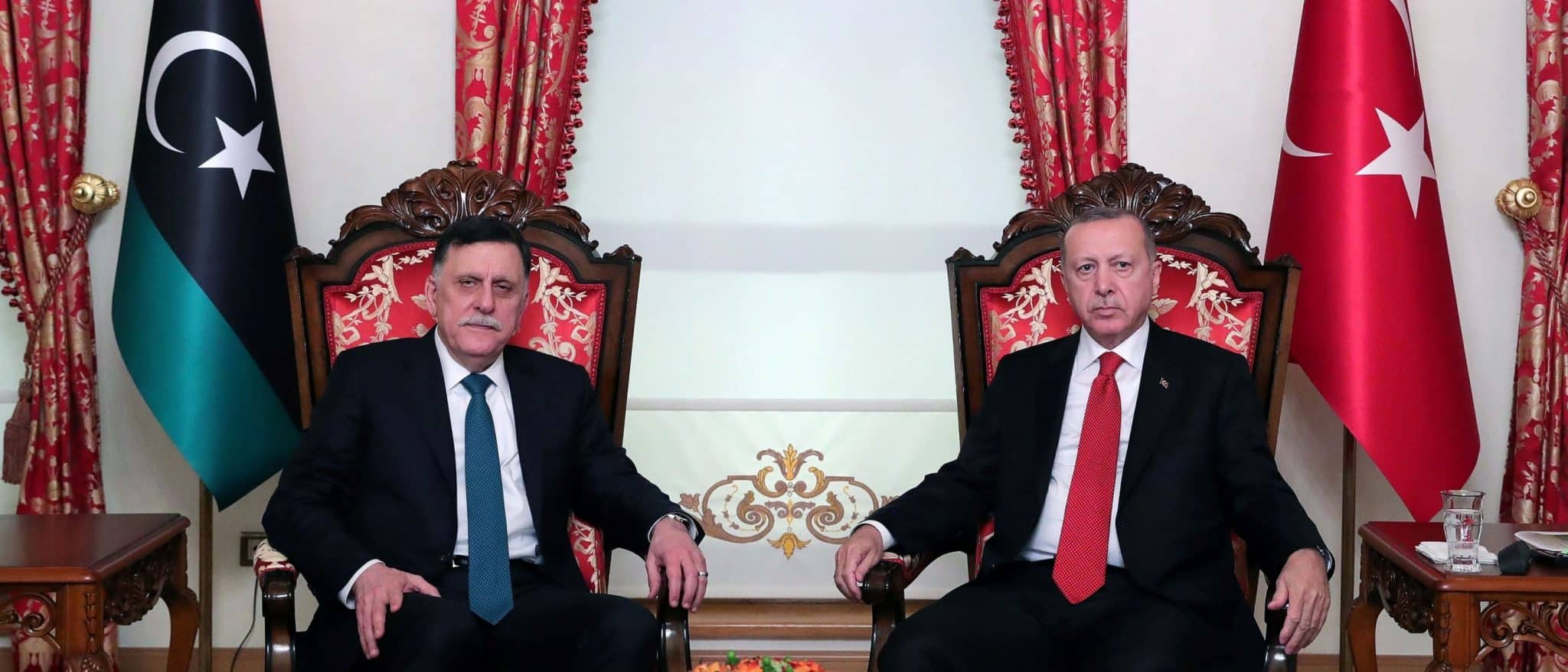Recep Erdogan’s unfolding grand project in the East Mediterranean is his riskiest move ever
Turkey’s parliament recently signed a comprehensive security and defense cooperation memorandum of understanding with Libya, which some fear could lead to a military confrontation between two factions in the country.
The approval on Saturday by the foreign relations commission of the Turkish parliament for the recently-signed comprehensive security and defense cooperation MoU with Libya has fuelled alarmist predictions that a military confrontation is looming with Libyan renegade general Khalifa Haftar, who announced only last week a “decisive battle” to capture Tripoli from the UN-backed Government of National Accord led by Prime Minister Fayez al-Sarraj.
But President Recep Erdogan’s unfolding grand project in the East Mediterranean, his riskiest ever, is principally aimed at strengthening Turkey’s independent and self-sufficient foreign policies. There is a national consensus in Turkey over it.
Israel is probably the only regional power which understands this. Israel’s official Kan radio made a seemingly innocuous disclosure on December 15 that “Ankara has expressed its willingness to enter into negotiations with Jerusalem on transferring Israeli gas supplies to the European continent through Turkish territory.”
“A high-ranking Turkish energy source has conveyed a message in this regard to Israel, explaining that his country is waiting for the formation of a stable government in Israel and the appointment of a new energy minister to discuss this issue,” the Israeli report added.
Interestingly, Ankara highlighted the Israeli disclosure within hours via the Anadolu state news agency. A high-stakes game is unfolding with potentials that go far beyond the Libyan warlord supported by Russia, Egypt, the UAE and Saudi Arabia.
Turkey’s support
Indeed, this is not to rule out a Turkish intervention in Libya. Sarraj passed through Istanbul on December 12 where he met Erdogan, who said later: “Al-Sarraj is the legitimate leader and Haftar is not. He has not been recognized internationally.”
Erdogan went on to express Turkey’s readiness to offer “all necessary support to Sarraj.” He repeated that Ankara could send military personnel to Libya once a request came from the GNA.
From Istanbul, Sarraj proceeded to Doha where he was received by Qatari emir Sheikh Tamim bin Hamad Al Thani on the same day. The emir also assured Sarraj of support in the “security and economic fields for efforts aimed at restoring security and stability in Libya.”
Turkey and Qatar move in tandem in regional politics and are, no doubt, in a joint venture to stall Haftar’s offensive on Tripoli, which is backed by Egypt, Saudi Arabia and the UAE. But that sideshow is not to be confused with the main thrust of Turkey’s pro activism in Libya – geopolitics of the East Mediterranean.
The US Geological Survey had estimated as far back as in 2010 that the natural gas reserves in the Levant Basin were in the region of 122 trillion cubic feet and pegged the recoverable reserves in the Nile Delta Basin at 223 trillion cubic feet – with distinct prospects that there’s more to be found.
Last year, the East Mediterranean Gas Forum came into being, comprising Cyprus, Israel, Egypt, Greece, Jordan, the Palestinian Authority and Italy, with US and EU support. The proposed EastMed Pipeline is a US$7.36 billion underwater natural gas pipeline project that will ship gas from Israeli and Cypriot fields across Cyprus and Greece to inter-connector terminals in Italy.
Maritime boundaries
Unsurprisingly, Turkey refuses to accept its exclusion from these profound regional developments. Turkey’s pledge of security support for Sarraj can be seen as quid pro quo for his agreement with Ankara last month demarcating an 18.6-nautical mile (35-kilometer) line that will form the maritime boundary separating the two countries’ economic zones.
To connect the dots, the Turkey-Libya deal on a maritime boundary implies in turn that any gas pipeline from the eastern Mediterranean will have to pass through Turkey’s Exclusive Economic Zone.
Now, one may endlessly quibble over the legality of the Turkish-Libyan maritime agreement, but Ankara holds the cards to block the EastMed Pipeline and force its sponsors to return to the abacus.
It may seem Turkey is playing the role of ‘spoiler,’ since it has no relations with Cyprus, is traditionally inimical toward Greece and has chilly relations with Egypt and Israel. Besides, Ankara is also pushing back at the US and the EU on various fronts and the discord over Libya (East Mediterranean Gas Forum) adds spice to it.
However, there is a big picture, as the Turkish offer to negotiate with Israel signals. Ankara has hinted that the mending of ties may become possible and discussions over a ‘win-win’ gas pipeline project can provide a good start.
It is no secret that Turkey, which is energy-deficient, aspires to become the regional hub for gas transportation to Europe. There shouldn’t be any conflict of interests on that score between Turkey and Israel. The Tamar and Leviathan fields off Israel’s coast are estimated to have 11 and 22 trillion cubic feet of gas reserves respectively, while Egypt’s Zohr field has another 30 trillion cubic feet.
Regional influence
Of course, it is up to Israel to assess how far pivotal its nascent alliance with Greece and Cyprus could be in its geo-strategies, although Washington has been promoting it to punish Turkey for its deepening relations with Russia.
Erdogan is embarking upon the most audacious foreign-policy project of his presidency so far by rewriting the rules in the Eastern Mediterranean. Call it ‘neo-Ottomanism’ or whatever, he aims to mitigate Turkey’s present isolation and restore its sweeping regional influence.
Erdogan is beginning with the least problematic of today’s ‘adversaries’ to promote a geopolitical realignment with enduring economic underpinnings – Israel. Clearly, Turkey’s dalliance with Libya goes much beyond a struggle with the Egypt-Saudi-Emirati troika over the Muslim Brotherhood’s destiny.
But Erdogan’s pathway is strewn with heavy boulders. The rivalries in this region are both historical and topical. Greece and Cyprus are intensely aware of Ankara’s claims in the Aegean Sea and on Cyprus and certain Greek islands and react sharply if the old foe flexes its muscles. And they are EU member countries.
In principle, Turkey’s constructive engagement of Israel ought to be a matter of satisfaction for Washington but in this case, there are caveats.
As US Defence Secretary Mark Esper remarked last week at the Reagan National Defense Forum, Washington also has overarching “concerns about Turkey’s direction that they may be spinning out of the NATO orbit.” Meanwhile, Russian President Vladimir Putin is planning to visit Israel next month and Gazprom has long-standing plans for developing and marketing Israel’s gas reserves. And Russia is Turkey’s principal provider of energy – by far.
Redazione
La redazione di Babilon è composta da giovani giornalisti, analisti e ricercatori attenti alle dinamiche mondiali. Il nostro obiettivo è rendere più comprensibile la geopolitica a tutti i tipi di lettori.
Dall’origine straniera all’icona americana: il fenomeno dello sport negli Usa
14 Mar 2024
Molti sport americani sono accomunati da un aspetto particolarmente curioso: raramente sono davvero nati sul suolo…
Roulette europea, francese o americana? Ecco un approfondimento
22 Set 2023
La roulette è un classico intramontabile dei casinò, amata da milioni di appassionati in tutto il mondo. Una delle…
Conto corrente online: perché è la soluzione migliore per i più giovani
21 Ott 2022
I millennial e i nativi digitali hanno dimostrato di essere una forza in grado di cambiare le carte in tavola nel…
L’intrattenimento online è dei casinò
31 Ago 2022
Il mondo dell’intrattenimento è vasto e ricco di opzioni. Con l’avvento di internet, poi, il settore non fatto altro…




